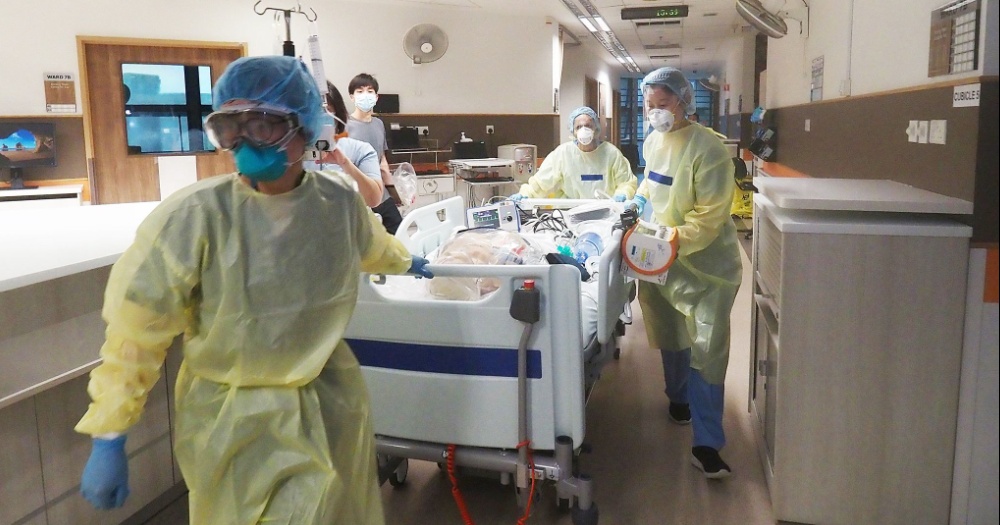[Update on Mar. 9, 6:30pm: The article has been updated with Senior Minister of State for Health Koh Poh Koon's response to MP Tan Wu Meng's speech.]
Follow us on Telegram for the latest updates: https://t.me/mothershipsg
PAP MP for Jurong GRC Tan Wu Meng called for a "deep review" of Singapore's healthcare system so that better support can be provided to healthcare workers of different backgrounds and journeys.
Better support for healthcare workers
Tan was referring to nurses, outsourced healthcare workers, and doctors during his speech in Parliament on Mar. 9.
Raise nurses' remuneration
On the topic of remuneration for nurses, Tan said "there is still room to look further at raising the remuneration of our nurses and allied health workers".
He acknowledged that improvements were announced in 2021, called on the government to "do a deep review" to "see what more can be done".
Support outsourced healthcare workers
Tan touched on outsourced healthcare workers as well, and asked for the Ministry of Health to provide an update on "what is being done to better support" this group.
He said they face the "same risk" while "facing the same virus" and are in the same patient care area as other frontliners.
Tan added: "Can MOH provide an update on what is being done to better support our outsourced sisters and brothers in healthcare?"
"Because every worker matters, including outsourced workers, because in a pandemic, the virus doesn't ask to read your contract terms and conditions before deciding whether to infect you. We need to continue looking at this and continue improving."
Effects of long shifts on doctors
As a doctor himself, Tan referenced his own experience to highlight the challenges faced by young doctors today, such as long working hours and heavier workload.
He said: "Today's patients are more sick, more complex than when I was a houseman many years ago."
As a result, doctors can work "a full day, sometimes starting at 6am, sometimes earlier, working the whole night, working for a significant part of the next day" before getting to rest.
As such, Tan said there is a need to "seek truth from facts" by finding out how healthcare workers’ performance is affected by long overnight shifts.
He cited evidence from the U.S. that showed that doctors become accident-prone at the tail-end of long shifts and after they get off work.
Tan called for a more inclusive workplace
The long hours and devotion required of healthcare workers might also not be sustainable for those in the industry, and there is a need to look at making healthcare workplaces family-friendly.
Tan cited the example of how some healthcare workers will return home to care for their family after spending their time at work caring for patients.
This includes nurses who continue to provide after-hour care to their elderly and unwell parent, after "a long shift caring for patients".
He said: "Nurses who after a long shift looking after very ill patients return home and have to care for parent who are ill with dementia, a parent who is themselves needing care."
Additionally, Tan said young doctors may worry about becoming a mother, as it may "have implications for their traineeship journey".
He called on a continuous improvement to the healthcare workplace, to make it more inclusive and family friendly, for the healthcare workers who come from "a diversity of backgrounds, and a diversity of personal journeys".
Koh Poh Koon's response to Tan in Parliament
Remuneration reviewed regularly
Senior Minister of State for Health Koh Poh Koon replied Tan's call for higher remuneration for nurses in Parliament on Mar. 9.
He said the Ministry of Health (MOH) has been reviewing remuneration regularly to ensure that it continues to attract and retain staff, and maintain its market competitiveness.
Koh said the salaries of nurses, allied health professionals, pharmacists and allied admin staff were enhanced in 2021, and added that there will be "a second tranche of increases for nurses" in 2022.
Additionally, the salaries of "selected groups of doctors and dentists" were last enhanced in 2019.
Koh remarked that MOH will continue to monitor and review salary benchmarks in a timely manner.
Healthcare award not just for healthcare staff
Like the local healthcare workers, Tan said outsourced healthcare workers are equally at risk of contracting Covid-19.
Stressing that "every worker matters", Tan asked what can be done to better support these outsourced healthcare workers.
Koh addressed this point and said: "MOH has extended the Covid-19 Healthcare Award not just to healthcare staff in public institutions, but also to outsourced staff."
The award is also offered to cleaners and security officers who were directly contracted by the public health institutions and publicly funded community care organisations, Koh added.
The Covid-19 Healthcare Award was announced last November as a gesture to recognise workers' contribution and dedication in the pandemic.
Recipients of the Covid-19 Healthcare Award can receive up to S$4,000 each.
In Parliament, Koh added that Singapore Civil Defence Force paramedics will also be recognised in their own way.
Follow and listen to our podcast here
Top image from Tan Tock Seng Hospital/Facebook
If you like what you read, follow us on Facebook, Instagram, Twitter and Telegram to get the latest updates.
